Personal and Professional Development Report: Skills, Needs, and Plans
VerifiedAdded on 2020/01/15
|17
|4997
|248
Report
AI Summary
This report provides a comprehensive analysis of personal and professional development, encompassing various aspects such as self-managed learning approaches, including interviews and social networks, and diverse learning styles like Kolb's and VARK models. The report includes a SWOT analysis to identify strengths, weaknesses, opportunities, and threats, alongside recommendations for learning and development methods. It explores the benefits of self-managed learning for individuals and organizations, addresses a work-based problem of stress through time management and emotional intelligence, and discusses communication strategies at different organizational levels using VARK learning styles. Furthermore, the report assesses current skills and competencies against organizational objectives, identifies personal and professional development needs, and culminates in the creation of a personal development plan with short-term and long-term objectives, incorporating planned activities and evaluation methods. The document is contributed by a student to be published on the website Desklib, a platform which provides all the necessary AI based study tools for students.
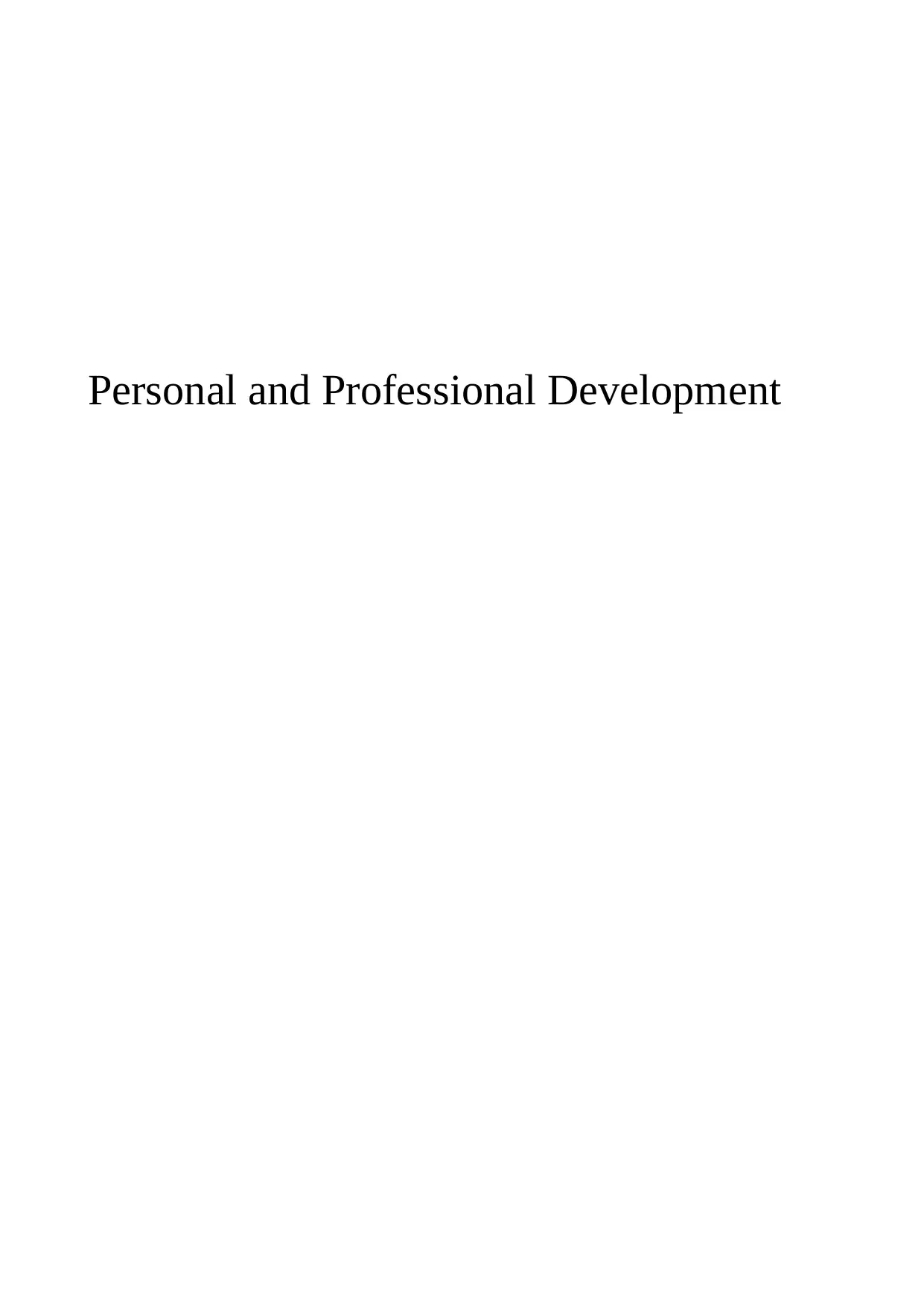
Personal and Professional Development
Paraphrase This Document
Need a fresh take? Get an instant paraphrase of this document with our AI Paraphraser
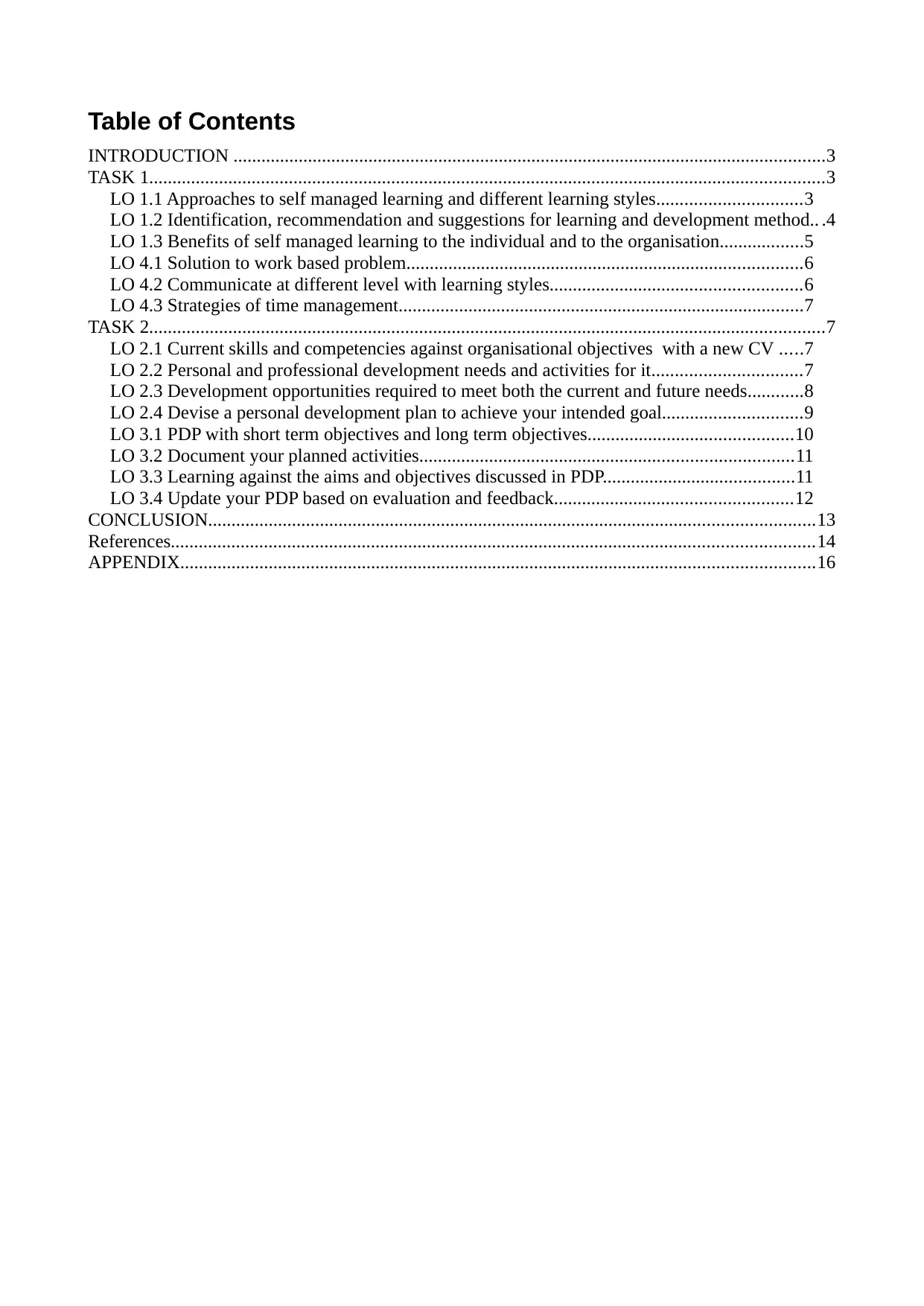
Table of Contents
INTRODUCTION ...............................................................................................................................3
TASK 1.................................................................................................................................................3
LO 1.1 Approaches to self managed learning and different learning styles...............................3
LO 1.2 Identification, recommendation and suggestions for learning and development method.. .4
LO 1.3 Benefits of self managed learning to the individual and to the organisation..................5
LO 4.1 Solution to work based problem.....................................................................................6
LO 4.2 Communicate at different level with learning styles......................................................6
LO 4.3 Strategies of time management.......................................................................................7
TASK 2.................................................................................................................................................7
LO 2.1 Current skills and competencies against organisational objectives with a new CV .....7
LO 2.2 Personal and professional development needs and activities for it................................7
LO 2.3 Development opportunities required to meet both the current and future needs............8
LO 2.4 Devise a personal development plan to achieve your intended goal..............................9
LO 3.1 PDP with short term objectives and long term objectives............................................10
LO 3.2 Document your planned activities................................................................................11
LO 3.3 Learning against the aims and objectives discussed in PDP.........................................11
LO 3.4 Update your PDP based on evaluation and feedback...................................................12
CONCLUSION..................................................................................................................................13
References..........................................................................................................................................14
APPENDIX........................................................................................................................................16
INTRODUCTION ...............................................................................................................................3
TASK 1.................................................................................................................................................3
LO 1.1 Approaches to self managed learning and different learning styles...............................3
LO 1.2 Identification, recommendation and suggestions for learning and development method.. .4
LO 1.3 Benefits of self managed learning to the individual and to the organisation..................5
LO 4.1 Solution to work based problem.....................................................................................6
LO 4.2 Communicate at different level with learning styles......................................................6
LO 4.3 Strategies of time management.......................................................................................7
TASK 2.................................................................................................................................................7
LO 2.1 Current skills and competencies against organisational objectives with a new CV .....7
LO 2.2 Personal and professional development needs and activities for it................................7
LO 2.3 Development opportunities required to meet both the current and future needs............8
LO 2.4 Devise a personal development plan to achieve your intended goal..............................9
LO 3.1 PDP with short term objectives and long term objectives............................................10
LO 3.2 Document your planned activities................................................................................11
LO 3.3 Learning against the aims and objectives discussed in PDP.........................................11
LO 3.4 Update your PDP based on evaluation and feedback...................................................12
CONCLUSION..................................................................................................................................13
References..........................................................................................................................................14
APPENDIX........................................................................................................................................16
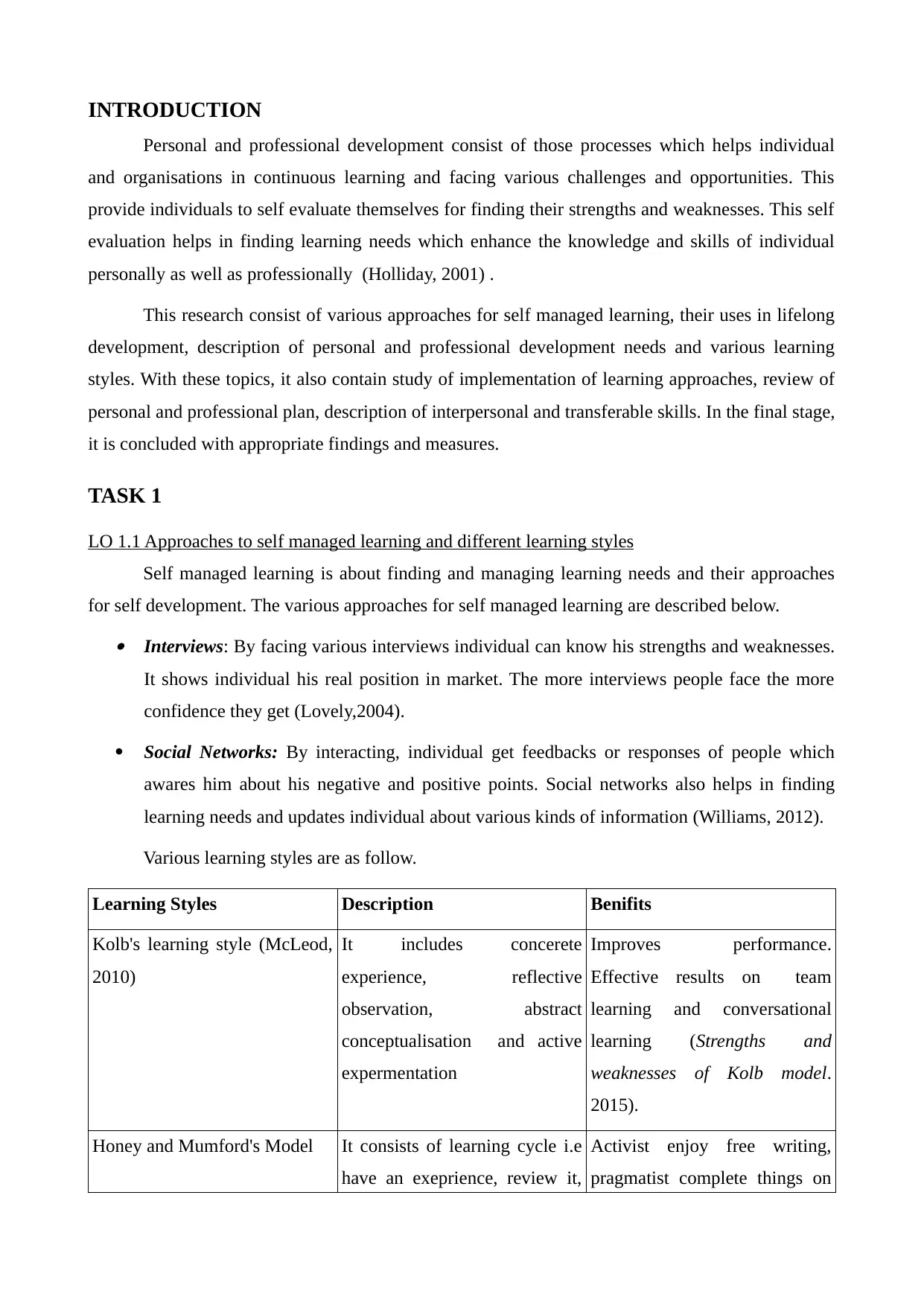
INTRODUCTION
Personal and professional development consist of those processes which helps individual
and organisations in continuous learning and facing various challenges and opportunities. This
provide individuals to self evaluate themselves for finding their strengths and weaknesses. This self
evaluation helps in finding learning needs which enhance the knowledge and skills of individual
personally as well as professionally (Holliday, 2001) .
This research consist of various approaches for self managed learning, their uses in lifelong
development, description of personal and professional development needs and various learning
styles. With these topics, it also contain study of implementation of learning approaches, review of
personal and professional plan, description of interpersonal and transferable skills. In the final stage,
it is concluded with appropriate findings and measures.
TASK 1
LO 1.1 Approaches to self managed learning and different learning styles
Self managed learning is about finding and managing learning needs and their approaches
for self development. The various approaches for self managed learning are described below.
Interviews: By facing various interviews individual can know his strengths and weaknesses.
It shows individual his real position in market. The more interviews people face the more
confidence they get (Lovely,2004).
Social Networks: By interacting, individual get feedbacks or responses of people which
awares him about his negative and positive points. Social networks also helps in finding
learning needs and updates individual about various kinds of information (Williams, 2012).
Various learning styles are as follow.
Learning Styles Description Benifits
Kolb's learning style (McLeod,
2010)
It includes concerete
experience, reflective
observation, abstract
conceptualisation and active
expermentation
Improves performance.
Effective results on team
learning and conversational
learning (Strengths and
weaknesses of Kolb model.
2015).
Honey and Mumford's Model It consists of learning cycle i.e
have an exeprience, review it,
Activist enjoy free writing,
pragmatist complete things on
Personal and professional development consist of those processes which helps individual
and organisations in continuous learning and facing various challenges and opportunities. This
provide individuals to self evaluate themselves for finding their strengths and weaknesses. This self
evaluation helps in finding learning needs which enhance the knowledge and skills of individual
personally as well as professionally (Holliday, 2001) .
This research consist of various approaches for self managed learning, their uses in lifelong
development, description of personal and professional development needs and various learning
styles. With these topics, it also contain study of implementation of learning approaches, review of
personal and professional plan, description of interpersonal and transferable skills. In the final stage,
it is concluded with appropriate findings and measures.
TASK 1
LO 1.1 Approaches to self managed learning and different learning styles
Self managed learning is about finding and managing learning needs and their approaches
for self development. The various approaches for self managed learning are described below.
Interviews: By facing various interviews individual can know his strengths and weaknesses.
It shows individual his real position in market. The more interviews people face the more
confidence they get (Lovely,2004).
Social Networks: By interacting, individual get feedbacks or responses of people which
awares him about his negative and positive points. Social networks also helps in finding
learning needs and updates individual about various kinds of information (Williams, 2012).
Various learning styles are as follow.
Learning Styles Description Benifits
Kolb's learning style (McLeod,
2010)
It includes concerete
experience, reflective
observation, abstract
conceptualisation and active
expermentation
Improves performance.
Effective results on team
learning and conversational
learning (Strengths and
weaknesses of Kolb model.
2015).
Honey and Mumford's Model It consists of learning cycle i.e
have an exeprience, review it,
Activist enjoy free writing,
pragmatist complete things on
⊘ This is a preview!⊘
Do you want full access?
Subscribe today to unlock all pages.

Trusted by 1+ million students worldwide
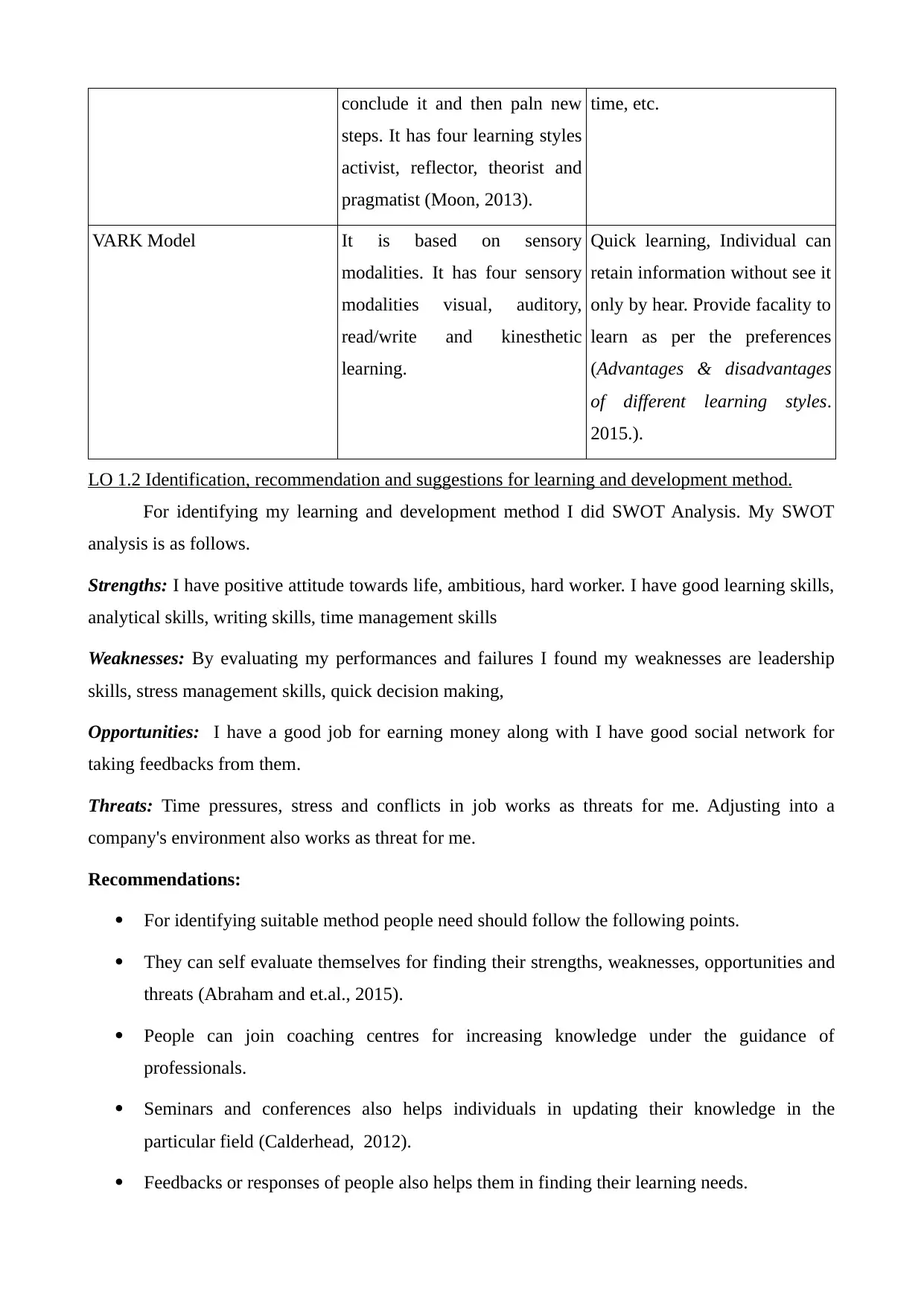
conclude it and then paln new
steps. It has four learning styles
activist, reflector, theorist and
pragmatist (Moon, 2013).
time, etc.
VARK Model It is based on sensory
modalities. It has four sensory
modalities visual, auditory,
read/write and kinesthetic
learning.
Quick learning, Individual can
retain information without see it
only by hear. Provide facality to
learn as per the preferences
(Advantages & disadvantages
of different learning styles.
2015.).
LO 1.2 Identification, recommendation and suggestions for learning and development method.
For identifying my learning and development method I did SWOT Analysis. My SWOT
analysis is as follows.
Strengths: I have positive attitude towards life, ambitious, hard worker. I have good learning skills,
analytical skills, writing skills, time management skills
Weaknesses: By evaluating my performances and failures I found my weaknesses are leadership
skills, stress management skills, quick decision making,
Opportunities: I have a good job for earning money along with I have good social network for
taking feedbacks from them.
Threats: Time pressures, stress and conflicts in job works as threats for me. Adjusting into a
company's environment also works as threat for me.
Recommendations:
For identifying suitable method people need should follow the following points.
They can self evaluate themselves for finding their strengths, weaknesses, opportunities and
threats (Abraham and et.al., 2015).
People can join coaching centres for increasing knowledge under the guidance of
professionals.
Seminars and conferences also helps individuals in updating their knowledge in the
particular field (Calderhead, 2012).
Feedbacks or responses of people also helps them in finding their learning needs.
steps. It has four learning styles
activist, reflector, theorist and
pragmatist (Moon, 2013).
time, etc.
VARK Model It is based on sensory
modalities. It has four sensory
modalities visual, auditory,
read/write and kinesthetic
learning.
Quick learning, Individual can
retain information without see it
only by hear. Provide facality to
learn as per the preferences
(Advantages & disadvantages
of different learning styles.
2015.).
LO 1.2 Identification, recommendation and suggestions for learning and development method.
For identifying my learning and development method I did SWOT Analysis. My SWOT
analysis is as follows.
Strengths: I have positive attitude towards life, ambitious, hard worker. I have good learning skills,
analytical skills, writing skills, time management skills
Weaknesses: By evaluating my performances and failures I found my weaknesses are leadership
skills, stress management skills, quick decision making,
Opportunities: I have a good job for earning money along with I have good social network for
taking feedbacks from them.
Threats: Time pressures, stress and conflicts in job works as threats for me. Adjusting into a
company's environment also works as threat for me.
Recommendations:
For identifying suitable method people need should follow the following points.
They can self evaluate themselves for finding their strengths, weaknesses, opportunities and
threats (Abraham and et.al., 2015).
People can join coaching centres for increasing knowledge under the guidance of
professionals.
Seminars and conferences also helps individuals in updating their knowledge in the
particular field (Calderhead, 2012).
Feedbacks or responses of people also helps them in finding their learning needs.
Paraphrase This Document
Need a fresh take? Get an instant paraphrase of this document with our AI Paraphraser
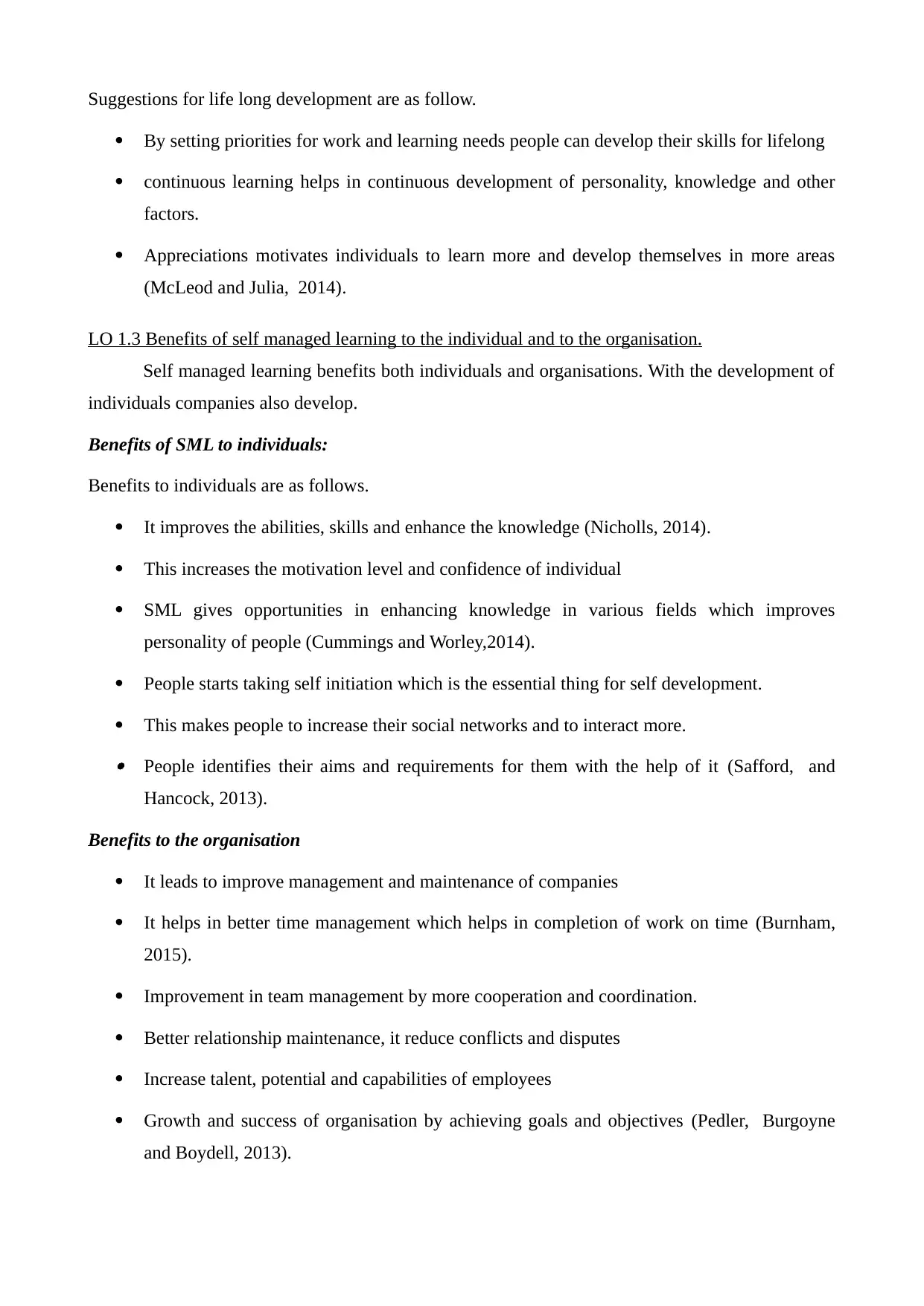
Suggestions for life long development are as follow.
By setting priorities for work and learning needs people can develop their skills for lifelong
continuous learning helps in continuous development of personality, knowledge and other
factors.
Appreciations motivates individuals to learn more and develop themselves in more areas
(McLeod and Julia, 2014).
LO 1.3 Benefits of self managed learning to the individual and to the organisation.
Self managed learning benefits both individuals and organisations. With the development of
individuals companies also develop.
Benefits of SML to individuals:
Benefits to individuals are as follows.
It improves the abilities, skills and enhance the knowledge (Nicholls, 2014).
This increases the motivation level and confidence of individual
SML gives opportunities in enhancing knowledge in various fields which improves
personality of people (Cummings and Worley,2014).
People starts taking self initiation which is the essential thing for self development.
This makes people to increase their social networks and to interact more.
People identifies their aims and requirements for them with the help of it (Safford, and
Hancock, 2013).
Benefits to the organisation
It leads to improve management and maintenance of companies
It helps in better time management which helps in completion of work on time (Burnham,
2015).
Improvement in team management by more cooperation and coordination.
Better relationship maintenance, it reduce conflicts and disputes
Increase talent, potential and capabilities of employees
Growth and success of organisation by achieving goals and objectives (Pedler, Burgoyne
and Boydell, 2013).
By setting priorities for work and learning needs people can develop their skills for lifelong
continuous learning helps in continuous development of personality, knowledge and other
factors.
Appreciations motivates individuals to learn more and develop themselves in more areas
(McLeod and Julia, 2014).
LO 1.3 Benefits of self managed learning to the individual and to the organisation.
Self managed learning benefits both individuals and organisations. With the development of
individuals companies also develop.
Benefits of SML to individuals:
Benefits to individuals are as follows.
It improves the abilities, skills and enhance the knowledge (Nicholls, 2014).
This increases the motivation level and confidence of individual
SML gives opportunities in enhancing knowledge in various fields which improves
personality of people (Cummings and Worley,2014).
People starts taking self initiation which is the essential thing for self development.
This makes people to increase their social networks and to interact more.
People identifies their aims and requirements for them with the help of it (Safford, and
Hancock, 2013).
Benefits to the organisation
It leads to improve management and maintenance of companies
It helps in better time management which helps in completion of work on time (Burnham,
2015).
Improvement in team management by more cooperation and coordination.
Better relationship maintenance, it reduce conflicts and disputes
Increase talent, potential and capabilities of employees
Growth and success of organisation by achieving goals and objectives (Pedler, Burgoyne
and Boydell, 2013).
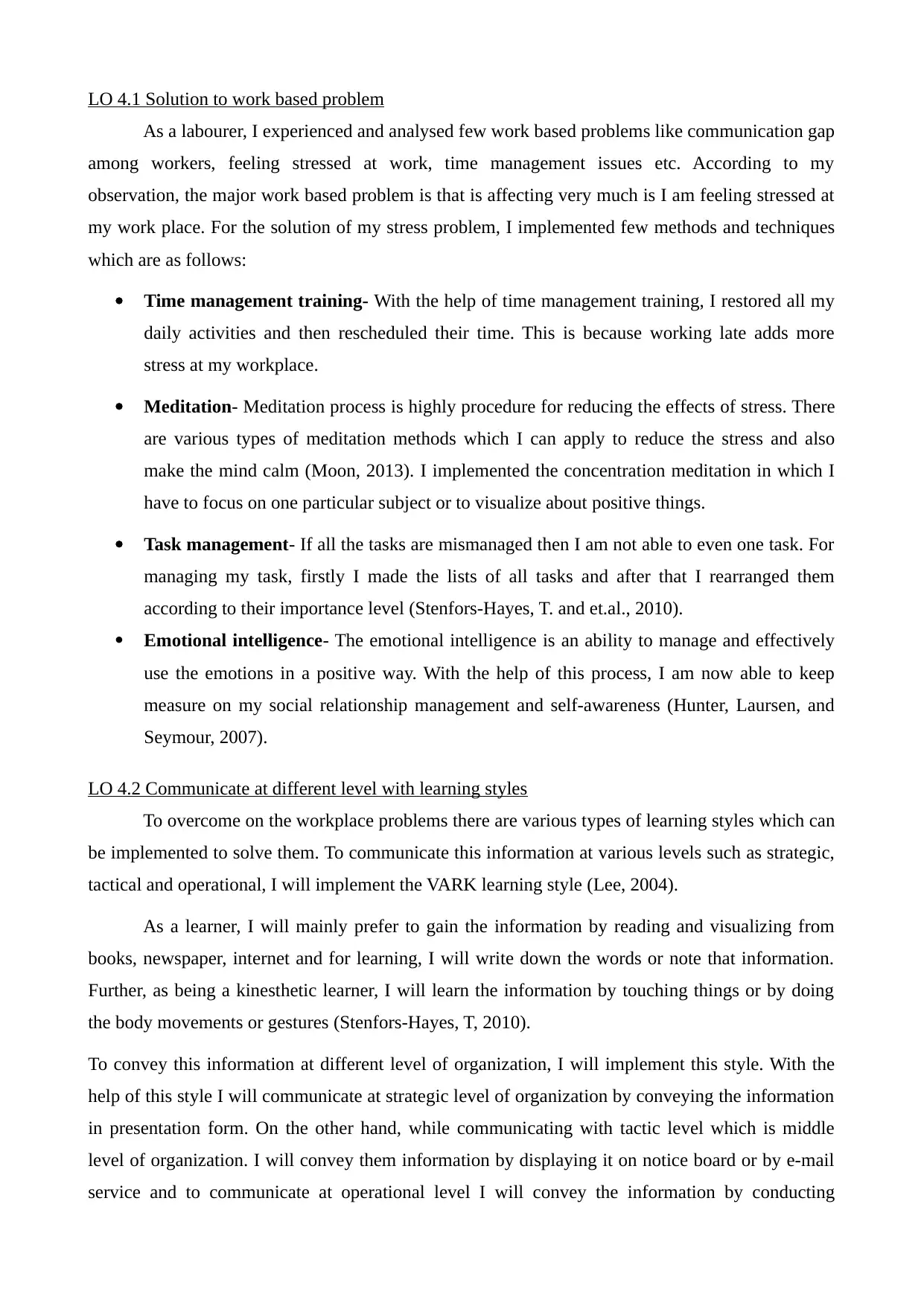
LO 4.1 Solution to work based problem
As a labourer, I experienced and analysed few work based problems like communication gap
among workers, feeling stressed at work, time management issues etc. According to my
observation, the major work based problem is that is affecting very much is I am feeling stressed at
my work place. For the solution of my stress problem, I implemented few methods and techniques
which are as follows:
Time management training- With the help of time management training, I restored all my
daily activities and then rescheduled their time. This is because working late adds more
stress at my workplace.
Meditation- Meditation process is highly procedure for reducing the effects of stress. There
are various types of meditation methods which I can apply to reduce the stress and also
make the mind calm (Moon, 2013). I implemented the concentration meditation in which I
have to focus on one particular subject or to visualize about positive things.
Task management- If all the tasks are mismanaged then I am not able to even one task. For
managing my task, firstly I made the lists of all tasks and after that I rearranged them
according to their importance level (Stenfors-Hayes, T. and et.al., 2010).
Emotional intelligence- The emotional intelligence is an ability to manage and effectively
use the emotions in a positive way. With the help of this process, I am now able to keep
measure on my social relationship management and self-awareness (Hunter, Laursen, and
Seymour, 2007).
LO 4.2 Communicate at different level with learning styles
To overcome on the workplace problems there are various types of learning styles which can
be implemented to solve them. To communicate this information at various levels such as strategic,
tactical and operational, I will implement the VARK learning style (Lee, 2004).
As a learner, I will mainly prefer to gain the information by reading and visualizing from
books, newspaper, internet and for learning, I will write down the words or note that information.
Further, as being a kinesthetic learner, I will learn the information by touching things or by doing
the body movements or gestures (Stenfors-Hayes, T, 2010).
To convey this information at different level of organization, I will implement this style. With the
help of this style I will communicate at strategic level of organization by conveying the information
in presentation form. On the other hand, while communicating with tactic level which is middle
level of organization. I will convey them information by displaying it on notice board or by e-mail
service and to communicate at operational level I will convey the information by conducting
As a labourer, I experienced and analysed few work based problems like communication gap
among workers, feeling stressed at work, time management issues etc. According to my
observation, the major work based problem is that is affecting very much is I am feeling stressed at
my work place. For the solution of my stress problem, I implemented few methods and techniques
which are as follows:
Time management training- With the help of time management training, I restored all my
daily activities and then rescheduled their time. This is because working late adds more
stress at my workplace.
Meditation- Meditation process is highly procedure for reducing the effects of stress. There
are various types of meditation methods which I can apply to reduce the stress and also
make the mind calm (Moon, 2013). I implemented the concentration meditation in which I
have to focus on one particular subject or to visualize about positive things.
Task management- If all the tasks are mismanaged then I am not able to even one task. For
managing my task, firstly I made the lists of all tasks and after that I rearranged them
according to their importance level (Stenfors-Hayes, T. and et.al., 2010).
Emotional intelligence- The emotional intelligence is an ability to manage and effectively
use the emotions in a positive way. With the help of this process, I am now able to keep
measure on my social relationship management and self-awareness (Hunter, Laursen, and
Seymour, 2007).
LO 4.2 Communicate at different level with learning styles
To overcome on the workplace problems there are various types of learning styles which can
be implemented to solve them. To communicate this information at various levels such as strategic,
tactical and operational, I will implement the VARK learning style (Lee, 2004).
As a learner, I will mainly prefer to gain the information by reading and visualizing from
books, newspaper, internet and for learning, I will write down the words or note that information.
Further, as being a kinesthetic learner, I will learn the information by touching things or by doing
the body movements or gestures (Stenfors-Hayes, T, 2010).
To convey this information at different level of organization, I will implement this style. With the
help of this style I will communicate at strategic level of organization by conveying the information
in presentation form. On the other hand, while communicating with tactic level which is middle
level of organization. I will convey them information by displaying it on notice board or by e-mail
service and to communicate at operational level I will convey the information by conducting
⊘ This is a preview!⊘
Do you want full access?
Subscribe today to unlock all pages.

Trusted by 1+ million students worldwide
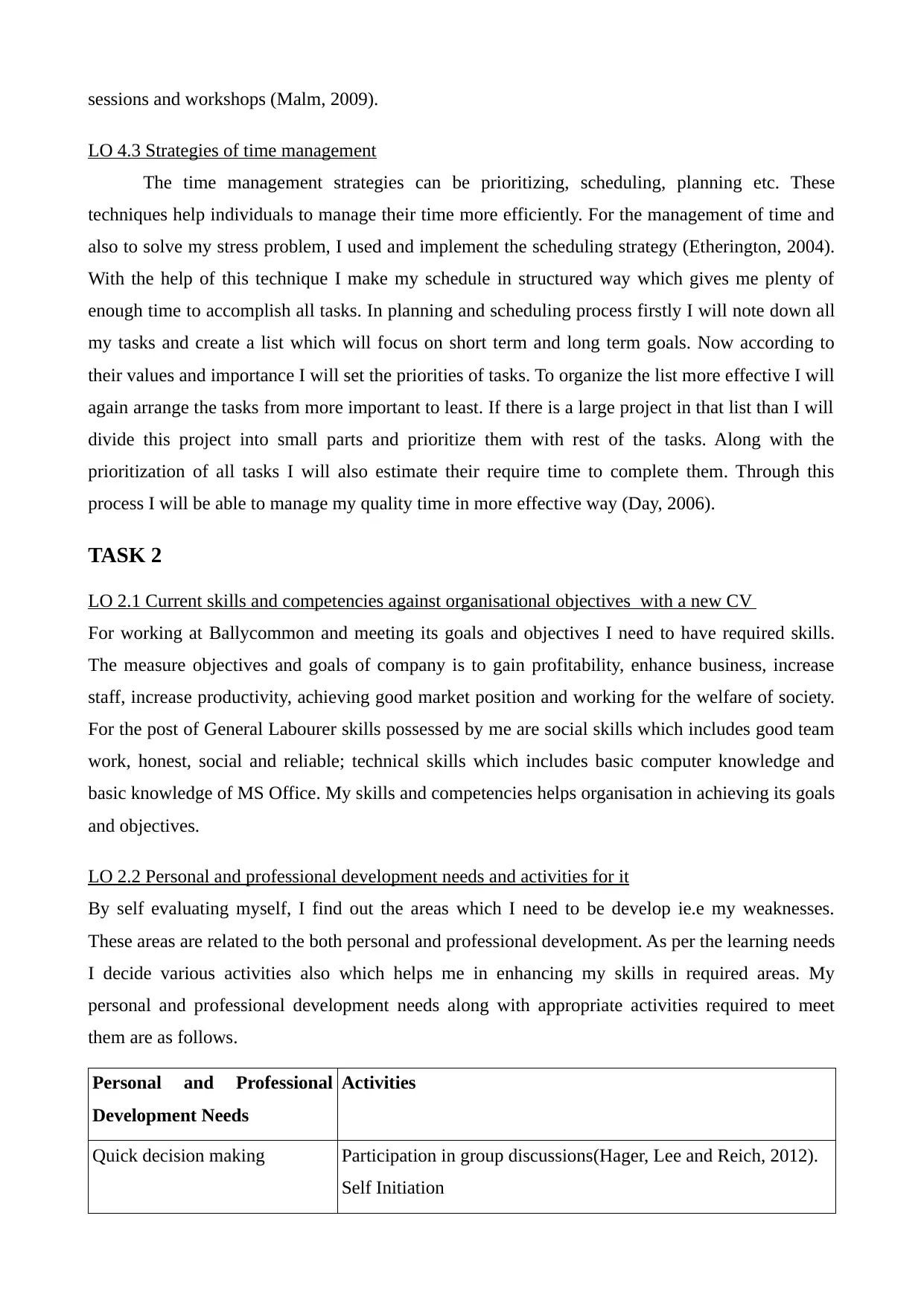
sessions and workshops (Malm, 2009).
LO 4.3 Strategies of time management
The time management strategies can be prioritizing, scheduling, planning etc. These
techniques help individuals to manage their time more efficiently. For the management of time and
also to solve my stress problem, I used and implement the scheduling strategy (Etherington, 2004).
With the help of this technique I make my schedule in structured way which gives me plenty of
enough time to accomplish all tasks. In planning and scheduling process firstly I will note down all
my tasks and create a list which will focus on short term and long term goals. Now according to
their values and importance I will set the priorities of tasks. To organize the list more effective I will
again arrange the tasks from more important to least. If there is a large project in that list than I will
divide this project into small parts and prioritize them with rest of the tasks. Along with the
prioritization of all tasks I will also estimate their require time to complete them. Through this
process I will be able to manage my quality time in more effective way (Day, 2006).
TASK 2
LO 2.1 Current skills and competencies against organisational objectives with a new CV
For working at Ballycommon and meeting its goals and objectives I need to have required skills.
The measure objectives and goals of company is to gain profitability, enhance business, increase
staff, increase productivity, achieving good market position and working for the welfare of society.
For the post of General Labourer skills possessed by me are social skills which includes good team
work, honest, social and reliable; technical skills which includes basic computer knowledge and
basic knowledge of MS Office. My skills and competencies helps organisation in achieving its goals
and objectives.
LO 2.2 Personal and professional development needs and activities for it
By self evaluating myself, I find out the areas which I need to be develop ie.e my weaknesses.
These areas are related to the both personal and professional development. As per the learning needs
I decide various activities also which helps me in enhancing my skills in required areas. My
personal and professional development needs along with appropriate activities required to meet
them are as follows.
Personal and Professional
Development Needs
Activities
Quick decision making Participation in group discussions(Hager, Lee and Reich, 2012).
Self Initiation
LO 4.3 Strategies of time management
The time management strategies can be prioritizing, scheduling, planning etc. These
techniques help individuals to manage their time more efficiently. For the management of time and
also to solve my stress problem, I used and implement the scheduling strategy (Etherington, 2004).
With the help of this technique I make my schedule in structured way which gives me plenty of
enough time to accomplish all tasks. In planning and scheduling process firstly I will note down all
my tasks and create a list which will focus on short term and long term goals. Now according to
their values and importance I will set the priorities of tasks. To organize the list more effective I will
again arrange the tasks from more important to least. If there is a large project in that list than I will
divide this project into small parts and prioritize them with rest of the tasks. Along with the
prioritization of all tasks I will also estimate their require time to complete them. Through this
process I will be able to manage my quality time in more effective way (Day, 2006).
TASK 2
LO 2.1 Current skills and competencies against organisational objectives with a new CV
For working at Ballycommon and meeting its goals and objectives I need to have required skills.
The measure objectives and goals of company is to gain profitability, enhance business, increase
staff, increase productivity, achieving good market position and working for the welfare of society.
For the post of General Labourer skills possessed by me are social skills which includes good team
work, honest, social and reliable; technical skills which includes basic computer knowledge and
basic knowledge of MS Office. My skills and competencies helps organisation in achieving its goals
and objectives.
LO 2.2 Personal and professional development needs and activities for it
By self evaluating myself, I find out the areas which I need to be develop ie.e my weaknesses.
These areas are related to the both personal and professional development. As per the learning needs
I decide various activities also which helps me in enhancing my skills in required areas. My
personal and professional development needs along with appropriate activities required to meet
them are as follows.
Personal and Professional
Development Needs
Activities
Quick decision making Participation in group discussions(Hager, Lee and Reich, 2012).
Self Initiation
Paraphrase This Document
Need a fresh take? Get an instant paraphrase of this document with our AI Paraphraser
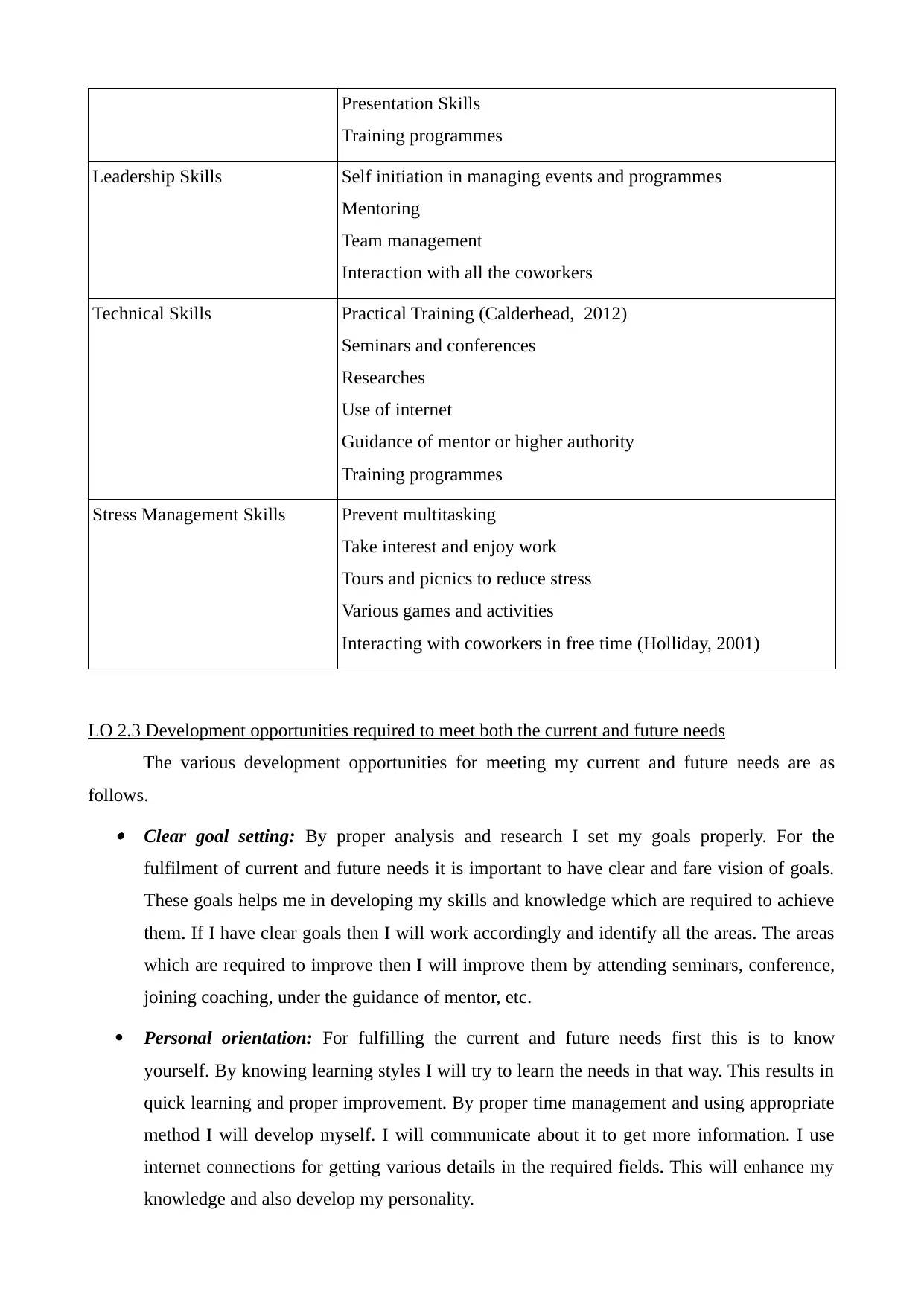
Presentation Skills
Training programmes
Leadership Skills Self initiation in managing events and programmes
Mentoring
Team management
Interaction with all the coworkers
Technical Skills Practical Training (Calderhead, 2012)
Seminars and conferences
Researches
Use of internet
Guidance of mentor or higher authority
Training programmes
Stress Management Skills Prevent multitasking
Take interest and enjoy work
Tours and picnics to reduce stress
Various games and activities
Interacting with coworkers in free time (Holliday, 2001)
LO 2.3 Development opportunities required to meet both the current and future needs
The various development opportunities for meeting my current and future needs are as
follows.
Clear goal setting: By proper analysis and research I set my goals properly. For the
fulfilment of current and future needs it is important to have clear and fare vision of goals.
These goals helps me in developing my skills and knowledge which are required to achieve
them. If I have clear goals then I will work accordingly and identify all the areas. The areas
which are required to improve then I will improve them by attending seminars, conference,
joining coaching, under the guidance of mentor, etc.
Personal orientation: For fulfilling the current and future needs first this is to know
yourself. By knowing learning styles I will try to learn the needs in that way. This results in
quick learning and proper improvement. By proper time management and using appropriate
method I will develop myself. I will communicate about it to get more information. I use
internet connections for getting various details in the required fields. This will enhance my
knowledge and also develop my personality.
Training programmes
Leadership Skills Self initiation in managing events and programmes
Mentoring
Team management
Interaction with all the coworkers
Technical Skills Practical Training (Calderhead, 2012)
Seminars and conferences
Researches
Use of internet
Guidance of mentor or higher authority
Training programmes
Stress Management Skills Prevent multitasking
Take interest and enjoy work
Tours and picnics to reduce stress
Various games and activities
Interacting with coworkers in free time (Holliday, 2001)
LO 2.3 Development opportunities required to meet both the current and future needs
The various development opportunities for meeting my current and future needs are as
follows.
Clear goal setting: By proper analysis and research I set my goals properly. For the
fulfilment of current and future needs it is important to have clear and fare vision of goals.
These goals helps me in developing my skills and knowledge which are required to achieve
them. If I have clear goals then I will work accordingly and identify all the areas. The areas
which are required to improve then I will improve them by attending seminars, conference,
joining coaching, under the guidance of mentor, etc.
Personal orientation: For fulfilling the current and future needs first this is to know
yourself. By knowing learning styles I will try to learn the needs in that way. This results in
quick learning and proper improvement. By proper time management and using appropriate
method I will develop myself. I will communicate about it to get more information. I use
internet connections for getting various details in the required fields. This will enhance my
knowledge and also develop my personality.
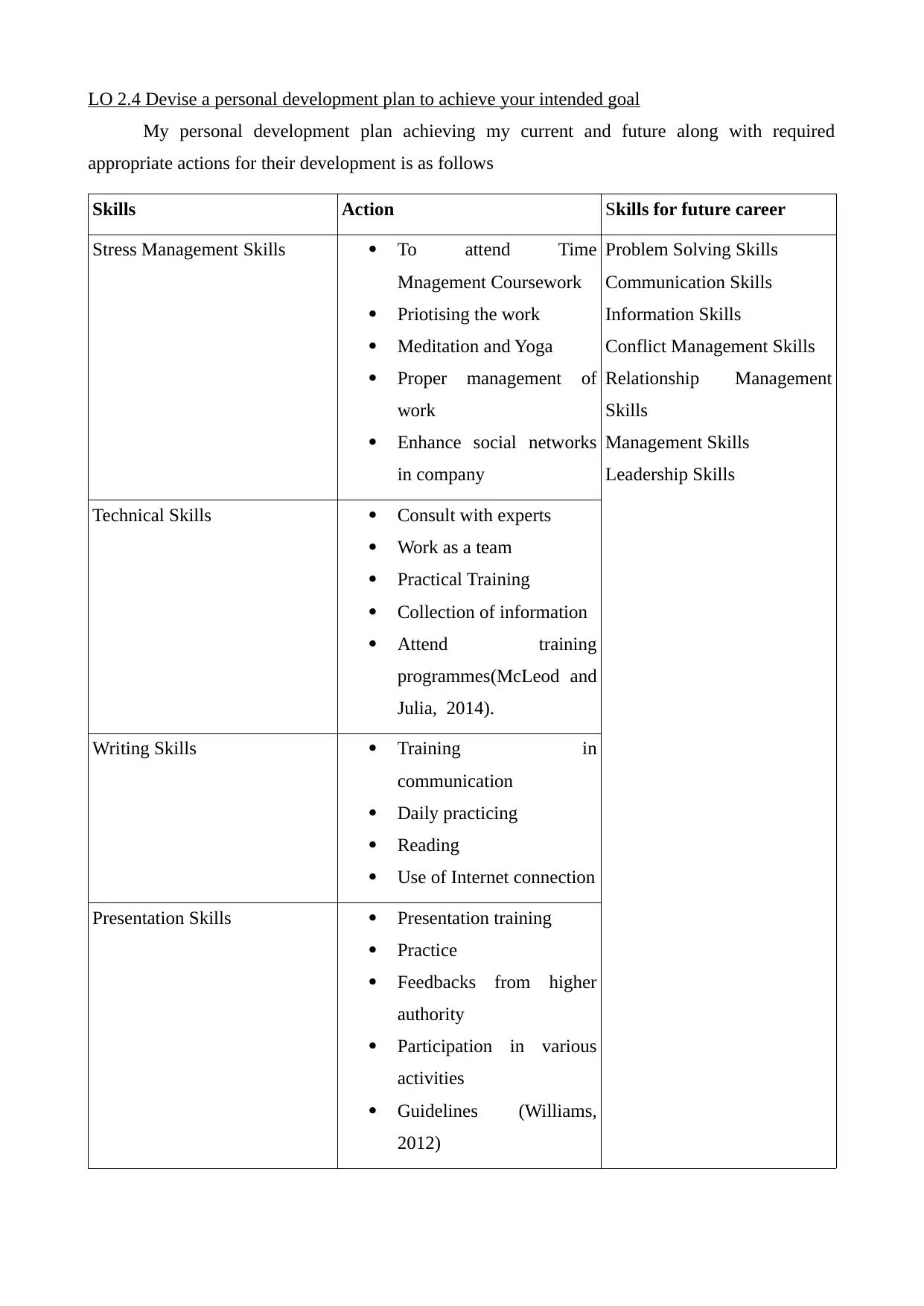
LO 2.4 Devise a personal development plan to achieve your intended goal
My personal development plan achieving my current and future along with required
appropriate actions for their development is as follows
Skills Action Skills for future career
Stress Management Skills To attend Time
Mnagement Coursework
Priotising the work
Meditation and Yoga
Proper management of
work
Enhance social networks
in company
Problem Solving Skills
Communication Skills
Information Skills
Conflict Management Skills
Relationship Management
Skills
Management Skills
Leadership Skills
Technical Skills Consult with experts
Work as a team
Practical Training
Collection of information
Attend training
programmes(McLeod and
Julia, 2014).
Writing Skills Training in
communication
Daily practicing
Reading
Use of Internet connection
Presentation Skills Presentation training
Practice
Feedbacks from higher
authority
Participation in various
activities
Guidelines (Williams,
2012)
My personal development plan achieving my current and future along with required
appropriate actions for their development is as follows
Skills Action Skills for future career
Stress Management Skills To attend Time
Mnagement Coursework
Priotising the work
Meditation and Yoga
Proper management of
work
Enhance social networks
in company
Problem Solving Skills
Communication Skills
Information Skills
Conflict Management Skills
Relationship Management
Skills
Management Skills
Leadership Skills
Technical Skills Consult with experts
Work as a team
Practical Training
Collection of information
Attend training
programmes(McLeod and
Julia, 2014).
Writing Skills Training in
communication
Daily practicing
Reading
Use of Internet connection
Presentation Skills Presentation training
Practice
Feedbacks from higher
authority
Participation in various
activities
Guidelines (Williams,
2012)
⊘ This is a preview!⊘
Do you want full access?
Subscribe today to unlock all pages.

Trusted by 1+ million students worldwide
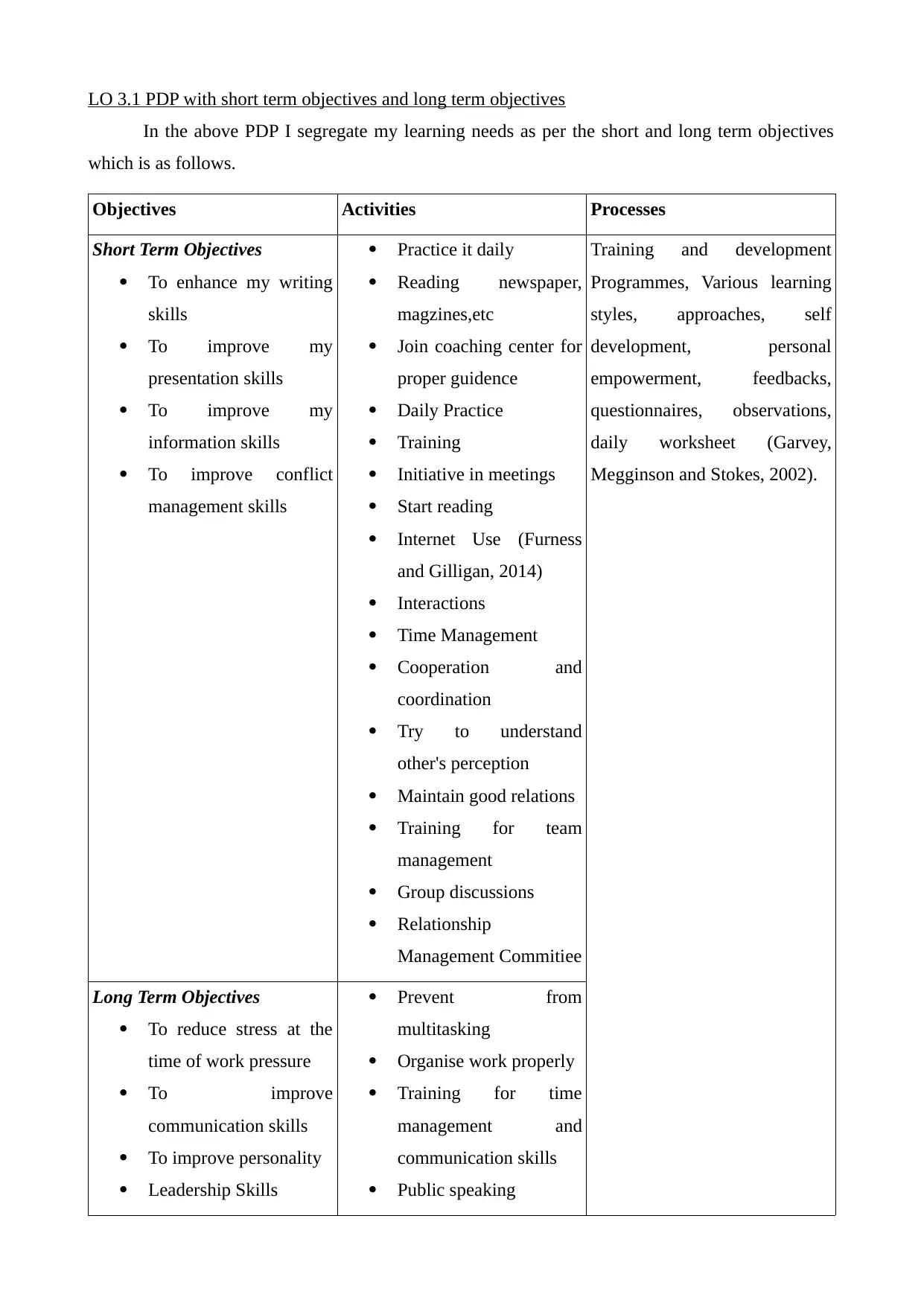
LO 3.1 PDP with short term objectives and long term objectives
In the above PDP I segregate my learning needs as per the short and long term objectives
which is as follows.
Objectives Activities Processes
Short Term Objectives
To enhance my writing
skills
To improve my
presentation skills
To improve my
information skills
To improve conflict
management skills
Practice it daily
Reading newspaper,
magzines,etc
Join coaching center for
proper guidence
Daily Practice
Training
Initiative in meetings
Start reading
Internet Use (Furness
and Gilligan, 2014)
Interactions
Time Management
Cooperation and
coordination
Try to understand
other's perception
Maintain good relations
Training for team
management
Group discussions
Relationship
Management Commitiee
Training and development
Programmes, Various learning
styles, approaches, self
development, personal
empowerment, feedbacks,
questionnaires, observations,
daily worksheet (Garvey,
Megginson and Stokes, 2002).
Long Term Objectives
To reduce stress at the
time of work pressure
To improve
communication skills
To improve personality
Leadership Skills
Prevent from
multitasking
Organise work properly
Training for time
management and
communication skills
Public speaking
In the above PDP I segregate my learning needs as per the short and long term objectives
which is as follows.
Objectives Activities Processes
Short Term Objectives
To enhance my writing
skills
To improve my
presentation skills
To improve my
information skills
To improve conflict
management skills
Practice it daily
Reading newspaper,
magzines,etc
Join coaching center for
proper guidence
Daily Practice
Training
Initiative in meetings
Start reading
Internet Use (Furness
and Gilligan, 2014)
Interactions
Time Management
Cooperation and
coordination
Try to understand
other's perception
Maintain good relations
Training for team
management
Group discussions
Relationship
Management Commitiee
Training and development
Programmes, Various learning
styles, approaches, self
development, personal
empowerment, feedbacks,
questionnaires, observations,
daily worksheet (Garvey,
Megginson and Stokes, 2002).
Long Term Objectives
To reduce stress at the
time of work pressure
To improve
communication skills
To improve personality
Leadership Skills
Prevent from
multitasking
Organise work properly
Training for time
management and
communication skills
Public speaking
Paraphrase This Document
Need a fresh take? Get an instant paraphrase of this document with our AI Paraphraser
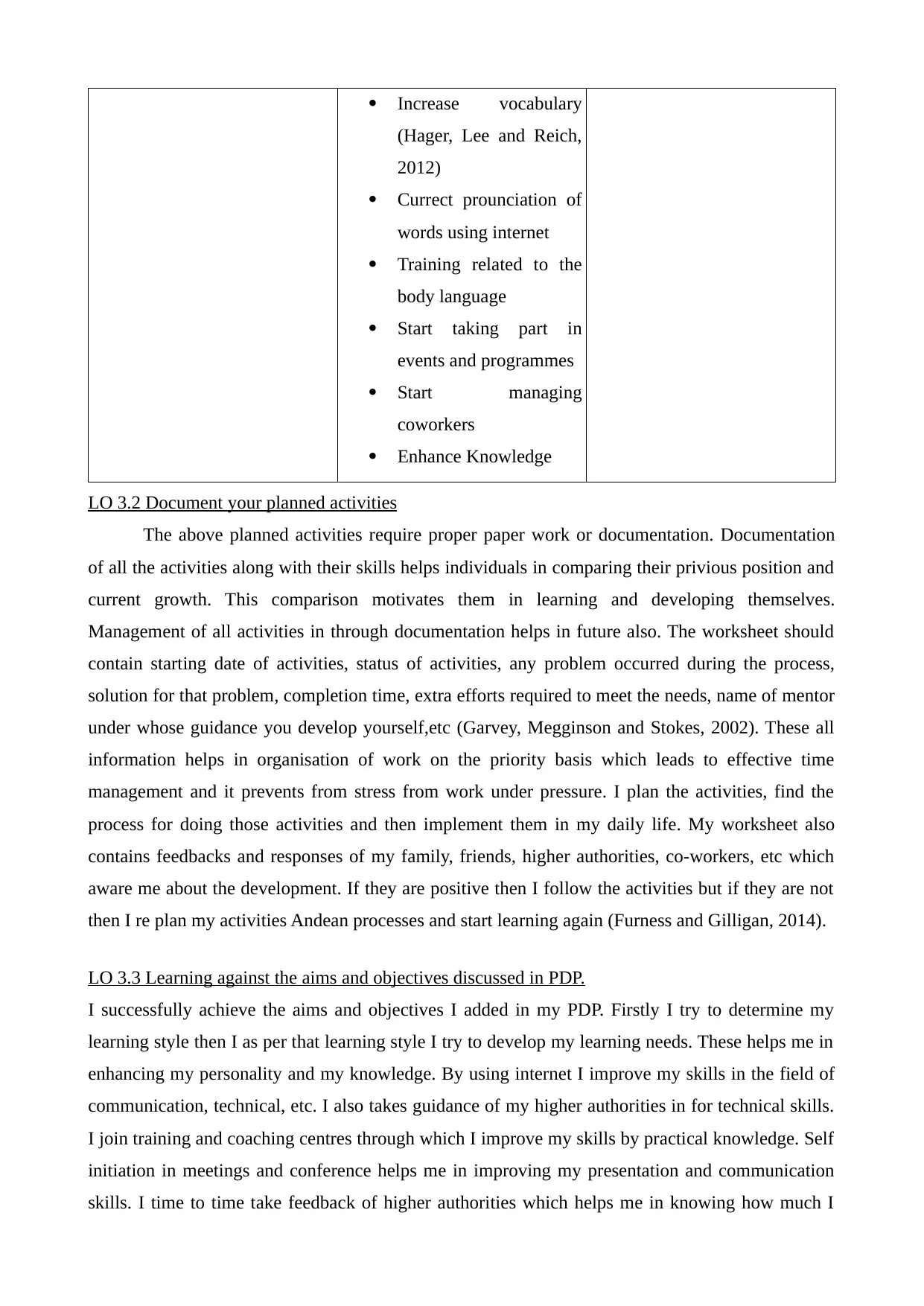
Increase vocabulary
(Hager, Lee and Reich,
2012)
Currect prounciation of
words using internet
Training related to the
body language
Start taking part in
events and programmes
Start managing
coworkers
Enhance Knowledge
LO 3.2 Document your planned activities
The above planned activities require proper paper work or documentation. Documentation
of all the activities along with their skills helps individuals in comparing their privious position and
current growth. This comparison motivates them in learning and developing themselves.
Management of all activities in through documentation helps in future also. The worksheet should
contain starting date of activities, status of activities, any problem occurred during the process,
solution for that problem, completion time, extra efforts required to meet the needs, name of mentor
under whose guidance you develop yourself,etc (Garvey, Megginson and Stokes, 2002). These all
information helps in organisation of work on the priority basis which leads to effective time
management and it prevents from stress from work under pressure. I plan the activities, find the
process for doing those activities and then implement them in my daily life. My worksheet also
contains feedbacks and responses of my family, friends, higher authorities, co-workers, etc which
aware me about the development. If they are positive then I follow the activities but if they are not
then I re plan my activities Andean processes and start learning again (Furness and Gilligan, 2014).
LO 3.3 Learning against the aims and objectives discussed in PDP.
I successfully achieve the aims and objectives I added in my PDP. Firstly I try to determine my
learning style then I as per that learning style I try to develop my learning needs. These helps me in
enhancing my personality and my knowledge. By using internet I improve my skills in the field of
communication, technical, etc. I also takes guidance of my higher authorities in for technical skills.
I join training and coaching centres through which I improve my skills by practical knowledge. Self
initiation in meetings and conference helps me in improving my presentation and communication
skills. I time to time take feedback of higher authorities which helps me in knowing how much I
(Hager, Lee and Reich,
2012)
Currect prounciation of
words using internet
Training related to the
body language
Start taking part in
events and programmes
Start managing
coworkers
Enhance Knowledge
LO 3.2 Document your planned activities
The above planned activities require proper paper work or documentation. Documentation
of all the activities along with their skills helps individuals in comparing their privious position and
current growth. This comparison motivates them in learning and developing themselves.
Management of all activities in through documentation helps in future also. The worksheet should
contain starting date of activities, status of activities, any problem occurred during the process,
solution for that problem, completion time, extra efforts required to meet the needs, name of mentor
under whose guidance you develop yourself,etc (Garvey, Megginson and Stokes, 2002). These all
information helps in organisation of work on the priority basis which leads to effective time
management and it prevents from stress from work under pressure. I plan the activities, find the
process for doing those activities and then implement them in my daily life. My worksheet also
contains feedbacks and responses of my family, friends, higher authorities, co-workers, etc which
aware me about the development. If they are positive then I follow the activities but if they are not
then I re plan my activities Andean processes and start learning again (Furness and Gilligan, 2014).
LO 3.3 Learning against the aims and objectives discussed in PDP.
I successfully achieve the aims and objectives I added in my PDP. Firstly I try to determine my
learning style then I as per that learning style I try to develop my learning needs. These helps me in
enhancing my personality and my knowledge. By using internet I improve my skills in the field of
communication, technical, etc. I also takes guidance of my higher authorities in for technical skills.
I join training and coaching centres through which I improve my skills by practical knowledge. Self
initiation in meetings and conference helps me in improving my presentation and communication
skills. I time to time take feedback of higher authorities which helps me in knowing how much I
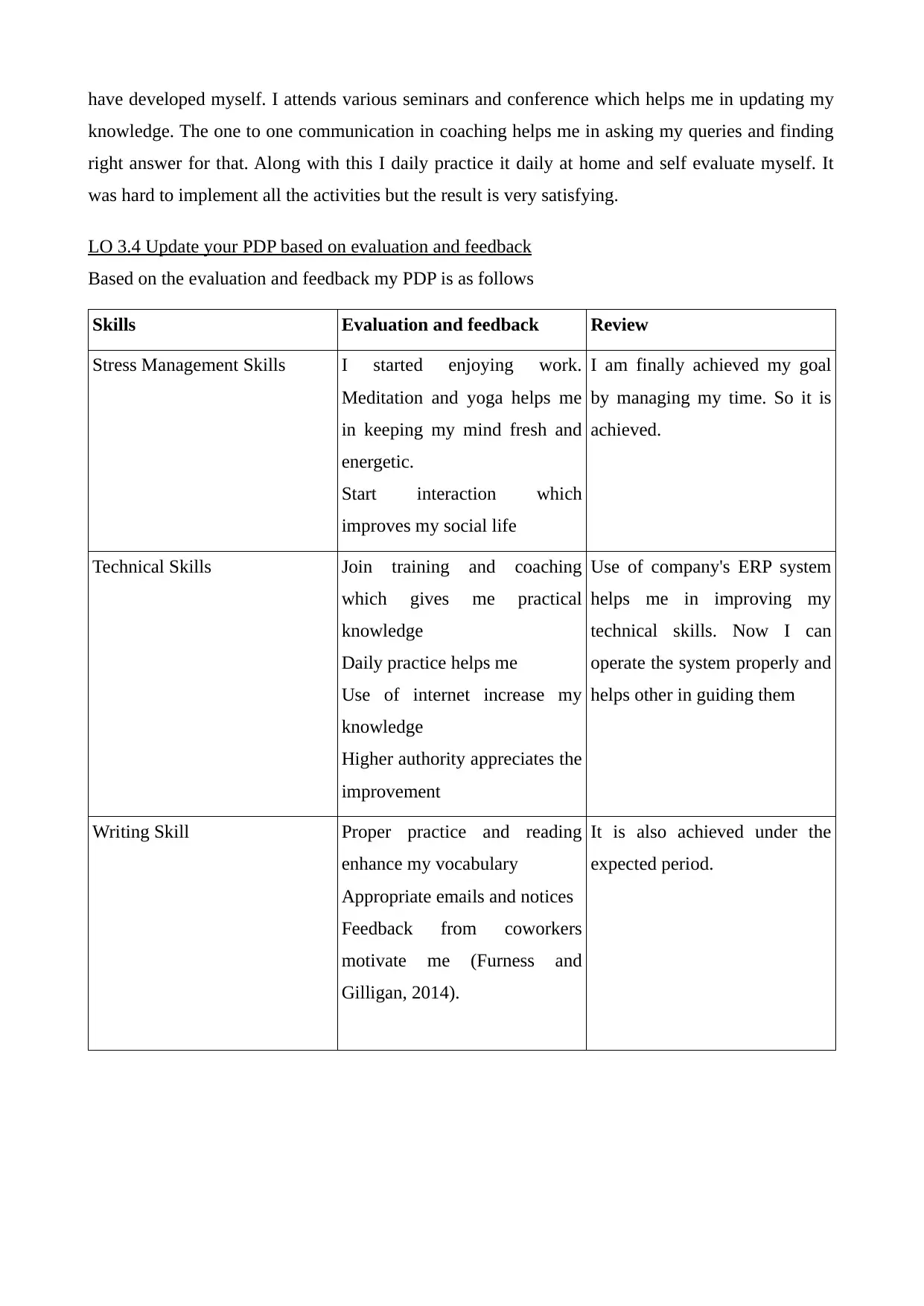
have developed myself. I attends various seminars and conference which helps me in updating my
knowledge. The one to one communication in coaching helps me in asking my queries and finding
right answer for that. Along with this I daily practice it daily at home and self evaluate myself. It
was hard to implement all the activities but the result is very satisfying.
LO 3.4 Update your PDP based on evaluation and feedback
Based on the evaluation and feedback my PDP is as follows
Skills Evaluation and feedback Review
Stress Management Skills I started enjoying work.
Meditation and yoga helps me
in keeping my mind fresh and
energetic.
Start interaction which
improves my social life
I am finally achieved my goal
by managing my time. So it is
achieved.
Technical Skills Join training and coaching
which gives me practical
knowledge
Daily practice helps me
Use of internet increase my
knowledge
Higher authority appreciates the
improvement
Use of company's ERP system
helps me in improving my
technical skills. Now I can
operate the system properly and
helps other in guiding them
Writing Skill Proper practice and reading
enhance my vocabulary
Appropriate emails and notices
Feedback from coworkers
motivate me (Furness and
Gilligan, 2014).
It is also achieved under the
expected period.
knowledge. The one to one communication in coaching helps me in asking my queries and finding
right answer for that. Along with this I daily practice it daily at home and self evaluate myself. It
was hard to implement all the activities but the result is very satisfying.
LO 3.4 Update your PDP based on evaluation and feedback
Based on the evaluation and feedback my PDP is as follows
Skills Evaluation and feedback Review
Stress Management Skills I started enjoying work.
Meditation and yoga helps me
in keeping my mind fresh and
energetic.
Start interaction which
improves my social life
I am finally achieved my goal
by managing my time. So it is
achieved.
Technical Skills Join training and coaching
which gives me practical
knowledge
Daily practice helps me
Use of internet increase my
knowledge
Higher authority appreciates the
improvement
Use of company's ERP system
helps me in improving my
technical skills. Now I can
operate the system properly and
helps other in guiding them
Writing Skill Proper practice and reading
enhance my vocabulary
Appropriate emails and notices
Feedback from coworkers
motivate me (Furness and
Gilligan, 2014).
It is also achieved under the
expected period.
⊘ This is a preview!⊘
Do you want full access?
Subscribe today to unlock all pages.

Trusted by 1+ million students worldwide
1 out of 17
Related Documents
Your All-in-One AI-Powered Toolkit for Academic Success.
+13062052269
info@desklib.com
Available 24*7 on WhatsApp / Email
![[object Object]](/_next/static/media/star-bottom.7253800d.svg)
Unlock your academic potential
Copyright © 2020–2026 A2Z Services. All Rights Reserved. Developed and managed by ZUCOL.





